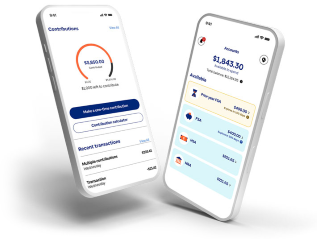Contributing the maximum to your HSA each year could help you build up your nest egg so you're prepared for expected and unexpected health care costs. Not only will you get the most tax benefits by maxing out your contributions, but having a fully funded HSA will prepare you for the year ahead. Take charge of your medical expenses and fund your account today.
Did you know? Your HSA goes wherever you go.
Even if you retire, change jobs or change health plans, your HSA — and all the available funds in it — are still yours. And because your funds roll over from year to year, you can feel a little more comfortable knowing that when qualified medical expenses come up, you can be covered … for as long as you have your account and keep it funded.
Your money. Your HSA.
Whether you've just opened your HSA or you're preparing for retirement, there are a number of benefits to funding your HSA.

Go beyond deductibles and copays
Even if you are young and healthy, funding your account now can help pay for everyday qualified medical expenses — such as acupuncture, chiropractic care and more.

Save for your family's future
Fund your account to help pay for qualified medical expenses you know might come up, like dental braces, or costs that might catch you by surprise, like an ER trip.

Invest in your future
Once your HSA reaches a certain designated balance, typically $2,000, you may choose to invest a portion of your HSA dollars.
Know the limit to go the limit
Contributing the maximum limit each year gives you the biggest tax savings.
2025 HSA contribution limits:
- $4,300 for individual coverage
- $8,550 for family coverage
2026 HSA contribution limits:
- $4,400 for individual coverage
- $8,750 for family coverage
The IRS sets guidelines for how much you can contribute to an HSA each year. You have until the tax filing deadline (typically April 15) to make contributions to your HSA for the previous year.
Catch-up contribution
Once you turn 55, you can contribute an additional $1,000 each year to your HSA, called a catch-up contribution. If you and your spouse are both over the age of 55, you can each contribute an additional $1,000. Your spouse will just need to open their own HSA for their additional portion. Make a catch up contribution today.
Did you know? After turning 65 you can use your HSA funds for non-qualified expenses. You’ll pay ordinary income tax on those funds, but the 20% tax penalty no longer applies.
Related resources
On demand
A big part of making the most of your HSA is understanding all of its uses.
Calculators and tools
Use our qualified medical expense tool to filter by account type and expense type to see if it qualifies.







